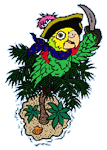|
When purchasing a companion parrot -- read all you can from quality sources and ask a lot of questions. Not only about the bird species you are choosing, but about the breeder you are purchasing from, their background, the number of birds they raise, their socialization techniques, hand feeding techniques, and veterinary care. With the recent surge of chain stores selling birds veterinarians are seeing more illness then ever. Unfortunately many of these birds come from quantity over quality breeding situations.
For instance all parrots at Parrot Island were bred in a few selected aviaries. These are "closed" aviaries, which means no new birds have been introduced for upwards of eight to twelve years. All breeders have been approved by our selected veterinarians. This is the reason why you will never see a huge selection of birds for sale at our store. Not only would it be too difficult to keep them clean, socialized and cared for properly, but we are unwilling to bring in birds from any source that does not meet our criteria. The birds for sale at Parrot Island are carefully selected. The breeder's ability to produce a happy healthy baby, the over all temperament of the species, and early handling, feeding, and socialization are just some of our concerns.
All of the birds at Parrot Island were raised locally except for those raised by one out-state breeder. The primary breeder we used up until a few years ago was New World Aviaries. This aviary produced Sam, Columbo and Scooter. Unfortunately, one of the owners developed a severe skin condition due to the sterilization procedures necessary for healthy babies and had to discontinue breeding. At that time we were forced to look out-state. This was not a decision that Terry or I took lightly. Not only did we research the breeder, ask our veterinary sources and Sally Blanchard of the Companion Parrot Quarterly (fka -- Pet Bird Report), but we also flew out to the breeder to see for ourselves. We were able to meet the breeder personally and see the babies in the nursery. Mateo, the beautiful Hyacinth Macaw we had last year was the first bird to come from this aviary. He flew home with us along with a baby Jardines Parrot. Since then we have had several other beautiful healthy babies.
One of our main concerns was shipping babies. We always pay to have the babies shipped counter to counter. This means the bird is the last one on the plane and the first off with us waiting at the airport for their arrival. Amazingly enough they come out of their travel box and into their cage at Parrot Island quite uneventfully. They are generally playing and feeling quite at home by the next day - at the longest.
It is the quantity over quality breeders and stores that make quality breeders hard to find. It is expensive to bring up a healthy well-socialized baby parrot. There are too many people willing to purchase birds from less than quality breeders and stores. So often we hear stories from our customers about how they have "rescued" a bird from an undesirable pet store or breeder. As admirable as it may sound to have helped this bird they have unknowingly doomed another. For each bird that is sold by these stores or breeders they now have your money to purchase two more. Breeders that do not concern themselves with disease control put all of our birds at risk.
Forced weaning is another way for breeders and stores to move birds through quickly. Many babies that are weaned too young, macaws in particular, suffer stunted growth and other related problems. It is well documented that many parrot species in the wild will be fed by their parents for upwards of a year. No baby is force weaned at Parrot Island. All birds are offered hand-feeding formula until they refuse it on their own. Our personal birds still take formula at least once a week. This helps form a better more parental bond with our birds. It will also allow us to easily medicate them should the need arise. Columbo, my Double Yellowhead Amazon has to hold the syringe himself and eagerly awaits his turn. Any of you that know Columbo can easily understand his need to show off.
Sally Blanchard's article titled "Why I Recommend Certain Breeders and Bird Shops" has been included in this folder. For the health of your bird and all birds - know your breeder or pet store before purchasing a companion bird.
|

